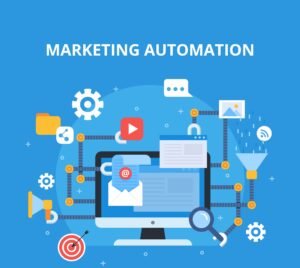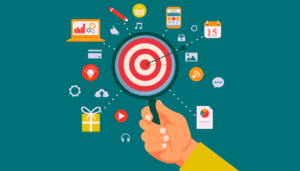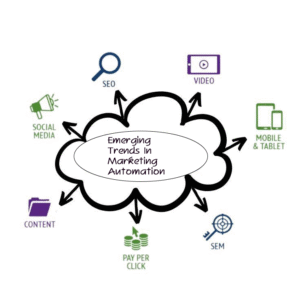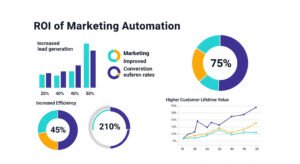Automation plays a pivotal role in transforming the dynamic landscape of digital marketing today. It simplifies repetitive tasks, boosts efficiency, and enables personalized interactions. By using tools for scheduling, targeting, and analytics, businesses can optimize campaigns, improve customer engagement, and achieve better results with less manual effort and more strategic focus.
As businesses strive to reach customers across multiple channels and platforms, marketing teams are turning to automation solutions to streamline processes, improve targeting, enhance customer experience, and ultimately drive stronger results. Digital Marketing Marketing Automation Tools and Trends You Need to Know have completely changed how campaigns are managed, measured, and optimized, making them essential in today’s highly competitive digital landsca
What is Marketing Automation?

Marketing automation is the use of digital tools and platforms to handle routine marketing tasks automatically. It enhances productivity by managing activities like email campaigns, social media scheduling, and lead nurturing, improving overall marketing effectiveness.These tasks often include email campaigns, social media posting, ad management, customer segmentation, lead nurturing, and data analysis. By automating these actions, marketers can improve efficiency, ensure consistency, and focus on strategic initiatives.
The core objective of marketing automation is to nurture prospects with highly personalized, useful content that helps convert them into loyal customers—without manual effort at every step of the journey.
Why Marketing Automation Matters

-
Efficiency and Productivity
Automation tools streamline workflows by removing manual steps and minimizing time-consuming tasks. They increase efficiency, reduce human error, and allow marketers to focus on strategy and creativity rather than repetitive operational activities.For example, scheduling posts on multiple social media platforms or sending hundreds of personalized emails can be done in minutes rather than hours. This allows marketing teams to focus on creative, strategic, and high-value activities.
-
Personalization at Scale
Modern consumers expect personalized experiences. Automation tools use data and AI to create individualized messages for different segments based on behaviors, preferences, and purchase history. This boosts engagement and improves conversion rates.
-
Data-Driven Decisions
Automation platforms gather and analyze vast amounts of data. From open rates and click-through rates to user journeys and ROI tracking, these tools empower marketers to make informed decisions based on real-time insights.
-
Lead Nurturing and Scoring
Marketing automation helps nurture leads through the sales funnel by delivering the right message at the right time.
-
Omnichannel Engagement
Consumers interact across different channels—emails, websites, social media, chatbots, and mobile apps. Automation platforms integrate these channels, ensuring seamless customer journeys and unified messaging.
Key Features of Digital Marketing Automation Tools

Email Automation: Automated drip campaigns, behavioral triggers, A/B testing, and performance tracking.
CRM Integration: Sync customer data to personalize campaigns and update records automatically.
Lead Scoring & Nurturing: Automatically identify and prioritize leads based on interactions.
Landing Page Builders: Create optimized landing pages with drag-and-drop tools.
Social Media Scheduling: Plan and post content across platforms like Facebook, Instagram, LinkedIn, and Twitter.
Analytics and Reporting: Dashboards that visualize performance metrics and conversion paths.
Workflow Automation: Workflow automation uses technology to streamline tasks, improving efficiency by reducing manual intervention and errors..
AI and Machine Learning: Predictive analytics, chatbots, and content recommendations.
Top Digital Marketing Automation Tools

-
HubSpot
HubSpot is an all-in-one inbound marketing, sales, and service platform. Its marketing automation features are highly regarded for user-friendliness, scalability, and deep CRM integration.
Key Features:
- Email marketing and nurturing workflows
- CRM integration and lead tracking
- Social media scheduling and SEO tools
- Landing page and form builders
- Real-time analytics and reporting
Ideal For: Small to mid-sized businesses looking for an all-in-one solution.
-
Mailchimp
Mailchimp is a marketing automation platform that helps businesses manage email campaigns, audience segmentation, and analytics. It offers tools for creating, sending, and tracking emails, enabling effective communication and engagement with customers and prospects.It offers automation features suitable for startups and small businesses.
Key Features:
- Email automation and segmentation
- Pre-built customer journeys
- A/B testing and analytics
- Landing page creation
- CRM integration
Ideal For: Beginners and small businesses focusing on email marketing.
-
Active Campaign
Active Campaign offers robust automation and CRM capabilities. It is particularly strong in customer experience automation, making it suitable for businesses that prioritize personalized communication.
Key Features:
- Advanced email workflows and segmentation
- Lead scoring and CRM
- Predictive content and automation maps
- SMS and chat messaging
Ideal For: Companies seeking powerful automation with deep personalization features.
-
Marketo Engage (by Adobe)
Marketo is a high-end automation platform designed for enterprise-level marketing operations. It supports complex, large-scale campaigns and deep integrations.
Key Features:
- Lead management and nurturing
- Account-based marketing (ABM)
- AI-powered insights and personalization
- Cross-channel campaign orchestration
- CRM and Salesforce integration
Ideal For: Large enterprises and B2B marketers.
-
Salesforce Marketing Cloud
Salesforce offers a robust suite of tools for email, mobile, social media, and web personalization. Its AI-powered features and tight integration with Salesforce CRM are key highlights.
Key Features:
- Journey Builder for personalized customer paths
- Einstein AI for predictive analytics
- Audience segmentation and targeting
- Email Studio and Advertising Studio
- Cross-channel messaging
Ideal For: Enterprises with complex customer journeys and multiple touchpoints.
-
Zoho Marketing Automation
Zoho offers a cost-effective solution with a full set of marketing automation features, suitable for startups and growing businesses.
Key Features:
- Multichannel campaign management
- Lead scoring and web behavior tracking
- Social media and email automation
- Website personalization
- Integrated analytics
Ideal For: Small to mid-sized businesses looking for affordable automation.
-
Pardot (by Salesforce)
Pardot focuses primarily on B2B marketing automation and lead management. It integrates seamlessly with Salesforce’s ecosystem and is favored by sales-driven organizations.
Key Features:
- Email marketing and lead nurturing
- ROI reporting and analytics
- Dynamic content personalization
- Form and landing page builders
- CRM integration
Emergency Trends In Marketing Automation

-
AI and Predictive Analytics
Artificial intelligence is redefining automation by analyzing user behavior, predicting future actions, and optimizing content in real-time. AI chatbots, recommendation engines, and intelligent email personalization are becoming the norm.
-
Hyper-Personalization
Beyond using a customer’s name, hyper-personalization leverages real-time data, browsing history, and AI to deliver messages tailored to specific micro-moments in the buyer’s journey.
-
Omnichannel Automation
Modern tools are increasingly supporting integrated campaigns across multiple channels—email, SMS, mobile apps, web push notifications, and social media—to maintain continuity and engagement.
-
Conversational Marketing
Chatbots, WhatsApp campaigns, and automated SMS flows are becoming essential for real-time interaction and nurturing. Tools are now automating conversation-based lead generation and support.
-
No-Code Automation
Marketers without technical expertise can now build complex workflows using intuitive drag-and-drop editors and visual journey builders, removing reliance on developers.
Benefits and ROI of Marketing Automation

-
Increased Conversion Rates
Automated follow-ups, personalized messages, and behavior-based triggers significantly enhance the likelihood of conversions by targeting prospects at the right time with the right content.
-
Improved Customer Retention
Consistent engagement, loyalty programs, and personalized communication foster stronger relationships, reducing churn and boosting lifetime customer value.
-
Higher Revenue
With precise targeting and optimization, businesses report increased marketing ROI. Automation ensures fewer missed opportunities and more efficient sales funnels.
-
Better Team Collaboration
Automation tools with shared dashboards and real-time data help marketing and sales teams align their strategies and goals effectively.
Challenges of Marketing Automation

Despite its many benefits, automation has certain challenges:
- Initial Cost and Complexity: Some platforms require significant investment and training.
- Over-automation: Excessive or impersonal automation can alienate customers.
- Data Privacy Regulations: Automation tools must comply with GDPR, CCPA, and other privacy laws.
- Integration Issues: Poor tool integration with CRM or other platforms can limit efficiency.
- Content Creation Bottleneck: Automation requires a steady stream of high-quality content, which can strain creative teams.
Best Practices for Implementing Marketing Automation

- Set Clear Goals: Define what you want to achieve—lead generation, customer retention, upselling, etc.
- Know Your Audience: Create buyer personas to design targeted journeys.
- Start Small: Begin with simple workflows and gradually build complexity.
- Test and Optimize: Regularly A/B test and refine messages, workflows, and CTAs.
- Integrate with CRM: Ensure seamless data flow between marketing and sales teams.
- Monitor Performance: Use built-in analytics to track KPIs and adjust strategies.
- Stay Compliant: Maintain transparency and user consent for data use.
Conclusion
Digital marketing automation tools have transformed how businesses engage with audiences, build relationships, and drive growth. From lead nurturing to omnichannel campaign execution, automation empowers marketers to do more with less effort and greater precision.
Whether you’re a startup looking to scale or a large enterprise managing complex campaigns, choosing the right automation platform can yield significant improvements in efficiency, customer satisfaction, and ROI. However, successful implementation requires strategy, creativity, and ongoing optimization.
In the future, as technology continues to evolve, automation will become even more intelligent, intuitive, and indispensable in every marketer’s toolkit.
- anas malik
Author – Vishnu Das PS
Website : www.vishbi.in

